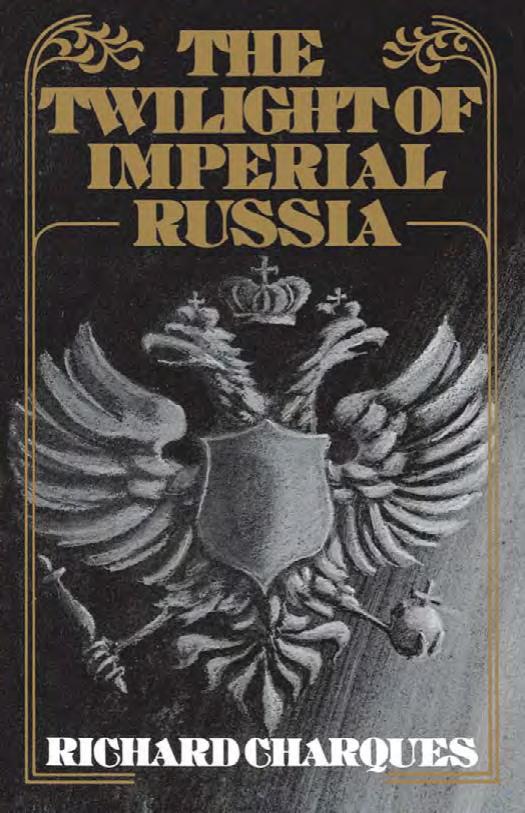The Twilight of Imperial Russia by Richard Charques

Author:Richard Charques [Charques, Richard]
Language: eng
Format: epub, pdf
Tags: History, Russia & the Former Soviet Union, Biography & Autobiography, Adventurers & Explorers, Travel, Russia, Europe, Baltic States
ISBN: 9781787203099
Google: JIx_DQAAQBAJ
Publisher: PicklePartners
Published: 2016-11-11T00:00:00+00:00
For the Ministry of the Interior the duel between the government and popular authority in St. Petersburg had not been the crucial issue. Formidable though the soviet was, it was overshadowed by the growing lawlessness and violence of the peasantry. The October manifesto had had little or no effect in the villages of Russia. It had done nothing to end peasant disturbances. Immediately after it was issued, indeed, agrarian risings on the Volga and in the western regions, above all in the Baltic provinces, where Russian peasants felt implacable hatred for their German masters, had reached a pitch of savagery more extreme than any that had attended agrarian unrest since the emancipation.
The government had no choice but to attempt to conciliate the peasantry also. An imperial manifesto published on 3 November called on the peasants to end all disorders and pledged the government to measures of relief âwithout injustice to the other landownersâ. At the same time, as an earnest of the resolve to satisfy the âurgent needsâ of the peasantry, redemption payments for 1906 were reduced by half and formally abolished as from 1 January 1907.{29} The disorders did not cease. Within a few days they reached a fearful climax of murder and destruction. In one province after another the government declared a state of emergency and directed punitive expeditions to the affected areas.
At precisely this time, 6-12 November, the Socialist-Revolutionary intellectuals of the Peasantsâ Union gathered once more in Moscow, openly this time and with a sprinkling of genuine peasants in their midst. Under the pressure of recent events, they had modified their views on the strategy by which socialism in peasant Russia was to be won. They rejected the October manifesto and repeated the demand for a constituent assembly. The campaign of terrorism was temporarily called off, though the suspension (which was not everywhere observed) was bitterly condemned by a sizable minority led by Savinkov. In general, the emotional aspect of Narodnik doctrine was now abandoned for a more coherent revolutionary policy and a specific programme of mass action.
The policy and the programme were largely the work of Victor Chernov, a remarkable figure in many ways though without the obdurate force of personality of other revolutionary leaders of the period. Born in 1873, the grandson of a serfâhis father, like Leninâs father, was an official who had been ennobledâChernov inherited the insurgent peasant tradition of the Volga black-earth lands. His feeling for the peasantry as the living and suffering body of Russia was unaffectedly deep. Since the summer months of 1905 (he had left Russia four years before) he had recognized both the futility of mere individual terror and the need to divert Socialist-Revolutionary propaganda from the urban intelligentsia to the village. His socialist ideas had always owed a good deal to Marxism, though with his conception of the village commune as a potentially socialist form of organization went a sincere and exalted vision of the free development of human personality. But he was always a theorist, and a somewhat woolly theorist at that.
Download
The Twilight of Imperial Russia by Richard Charques.pdf
This site does not store any files on its server. We only index and link to content provided by other sites. Please contact the content providers to delete copyright contents if any and email us, we'll remove relevant links or contents immediately.
Room 212 by Kate Stewart(5105)
The Crown by Robert Lacey(4806)
Endurance: Shackleton's Incredible Voyage by Alfred Lansing(4768)
The Iron Duke by The Iron Duke(4349)
The Rape of Nanking by Iris Chang(4202)
Joan of Arc by Mary Gordon(4099)
Killing England by Bill O'Reilly(3995)
Say Nothing by Patrick Radden Keefe(3975)
I'll Give You the Sun by Jandy Nelson(3428)
Shadow of Night by Deborah Harkness(3356)
Hitler's Monsters by Eric Kurlander(3328)
Mary, Queen of Scots, and the Murder of Lord Darnley by Alison Weir(3200)
Blood and Sand by Alex Von Tunzelmann(3194)
Eleanor & Park by Rainbow Rowell(3151)
Darkest Hour by Anthony McCarten(3119)
Margaret Thatcher: The Autobiography by Thatcher Margaret(3079)
Book of Life by Deborah Harkness(2930)
Red Famine: Stalin's War on Ukraine by Anne Applebaum(2927)
The One Memory of Flora Banks by Emily Barr(2856)
